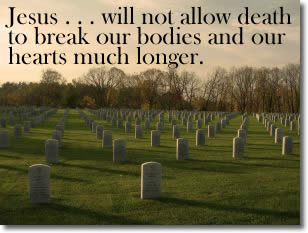Yesterday, I preached at the funeral of a very dear friend. Over the last 10 years, Cindy had become “family” to me, my wife, and our four daughters. For six of those years, she battled cancer valiantly and selflessly. On Sunday afternoon, Cindy finally won: the cancer is dead, and Cindy is in the presence of the Lord whom she loved, proclaimed, and served. She  enjoyed gazing on Christ from afar, but now she is doing so face-to-face. Victory!
enjoyed gazing on Christ from afar, but now she is doing so face-to-face. Victory!
To be honest, however, my heart aches. I feel almost schizophrenic—I have sincere joy for Cindy, but I also have a deep sorrow over the temporary loss of one so dear to me and to those I love. Sure, I’m not sorrowing “as those who have no hope” (1 Thess. 4:13), but I am sorrowing nonetheless.
As I spent extended time with Cindy’s family over the last few weeks, I had several opportunities to explain why God would allow such suffering to enter and end the life of one who loved Him so. The question faced me again last night as my five-year-old, with tears streaming down her face, told me, “I miss Miss Cindy.” She wept and surprised me with two very penetrating questions: “Why would Jesus let us die? Doesn’t He love us?”
How would you answer that?
I explained to her that Jesus absolutely loves us. “How much does He love us, Dear?”
“So much that He died for our sins,” she answered.
I explained that because Cindy knew Jesus as her Savior, the moment her body died, her soul—the real Cindy—was with Him. “She’s seeing Jesus face-to-face. She’s not struggling to breathe. She’s not in pain. She’s happy with Jesus.” Esther appeared to be satisfied with that answer.
I believe there’s a bigger answer, however. Certainly God allows such trials for our sanctification and for His glory, but I’m thinking in even broader terms. I’m looking all the way back to creation and all the way forward to the New Jerusalem. How does death fit into God’s plan for mankind? Some basic lessons from Scripture have provided a perspective that has encouraged me.
1. The world God created was good—”very good.” There was no sin, no suffering, no cancer, no death. That was God’s doing.
2. When mankind rebelled against God, sin and death marred God’s perfect creation. As a result and in fulfillment of God’s warning, mankind is spiritually dead and physically dying. Cancer? Death? Suffering? These are man’s doing. Certainly God is sovereign over all things, but mankind is culpable for sin and its effects. The result of man’s rebellion is that all creation is now groaning under the curse. Why did Jesus let Miss Cindy die? “Thorn and thistle.” It’s all about man’s sin; it’s all about the curse; it’s all about sins’ wages. And I believe that as much as death grieves us, it grieves our Lord. In a sense, I believe it angers Him. This is not how He created the world to be. Death is a perversion of His perfect Eden.
3. As soon as mankind sinned, God promised a solution. He promised a Savior who would crush Satan and undo the harm of the fall. The Old Testament Scriptures again and again prophesied that God’s Messiah would reverse the curse, and for millennia dying God-fearers longed for His coming.
4. God’s Messiah did come. He fulfilled Old Testament prophecy. He lived a perfect, sinless life, thus earning the very righteousness fallen sinners lack. He died a sacrificial death, thus paying the penalty for mankind’s sin by suffering the very wrath of God. By His death and resurrection, Jesus defeated sin and death. He won. As a result, those who are spiritually dead can be made spiritually alive.
And yet our bodies die. The curse is not entirely reversed. Not yet.
5. We now await Christ’s return. His Second Advent is not merely about defeating the Antichrist and inflicting judgment on a God-hating world; it’s about Christ’s finishing the job which God planned in eternity past and which Christ began two millennia ago. Sin has been defeated but not yet banished. Death’s sting and victory have been removed, but death itself is still at large and doing its worst, even to Christ’s own. But only for a time. The delay in Christ’s return is a merciful allowance of time for sinners to repent, but God will not allow death to rage forever. Death’s days are numbered. So we wait.
6. At Christ’s glorious return, He will fix this mess—the mess created by man’s rebellion way back in Eden. In so doing, He will finally redeem His creation from the fall, and He will do so entirely. Thus, Revelation 21-22 presents a reclaiming of Genesis 1-2, and heaven is a restored and improved Eden:
Now I saw a new heaven and a new earth, for the first heaven and the first earth had passed away. Also there was no more sea. Then I, John, saw the holy city, New Jerusalem, coming down out of heaven from God, prepared as a bride adorned for her husband. And I heard a loud voice from heaven saying, “Behold, the tabernacle of God is with men, and He will dwell with them, and they shall be His people. God Himself will be with them and be their God. And God will wipe away every tear from their eyes; there shall be no more death, nor sorrow, nor crying. There shall be no more pain, for the former things have passed away.” Then He who sat on the throne said, “Behold, I make all things new.” And He said to me, “Write, for these words are true and faithful.” (Revelation 21:1-5, NKJV)
And all of God’s creation will again be good—very, very good.
Yes, dear Esther, Jesus loves us. And He will not allow death to break our bodies and our hearts much longer.
“Even so, come, Lord Jesus.”
 Chris Anderson is the pastor of Tri-County Bible Church (Madison, OH), which he planted in 1998. He is the husband of Lori and the father of four sweet daughters. He is a member of The Ohio Bible Fellowship and an assistant editor for the OBF’s publication, The Visitor. This article is reprinted by permission from his blog, My Two Cents.
Chris Anderson is the pastor of Tri-County Bible Church (Madison, OH), which he planted in 1998. He is the husband of Lori and the father of four sweet daughters. He is a member of The Ohio Bible Fellowship and an assistant editor for the OBF’s publication, The Visitor. This article is reprinted by permission from his blog, My Two Cents.
No comments:
Post a Comment